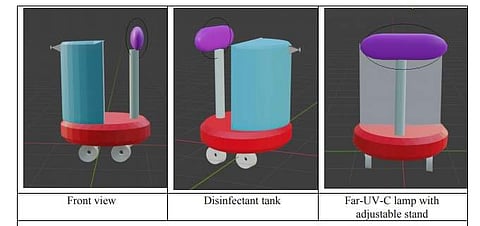

In the wake of COVID-19 pandemic, a team of students from the SSN College of Engineering in Chennai, have used an existing study that mass sanitisation can be done effectively by means of UV-C lamps and disinfectant sprays to come with a solution of disinfecting large areas quickly. Using the same knowledge, the students have developed a robot, Corover 2020, that can be used for two purposes — to disinfect distances up to 180 cm using UV-C-rays or spray disinfectant through an ultrasonic nozzle towards specific areas.
Many studies show that mass sanitisation can be done effectively by means of UV-C lamps and disinfectant sprays during this pandemic. The far-UV-C rays alter the RNA of the pathogen and prevent its further multiplication, while aerosol sprays disintegrate the protective lipid coating. "The proposed device is a simple robot having four wheels and two motors which can either use far-UV-C-rays to disinfect distances up to 180 cm or, can spray disinfectant through an ultrasonic nozzle towards specific areas. Since this can be used in the disinfection of large areas, it meets the need for mass sterilisation effectively, with minimal cost. An important feature of this product is that it can be used even after the pandemic abates," said Shwetha, one of the students who is a part of the team.
During the times when personal hygiene and sanitation can save lives, this robot can sterilise large areas at once, saving time and efforts of thousands of frontline workers. The government and health authorities can use this robot to disinfect red zone areas quickly and at a low price. The most notable thing about this robot is its cost — it is 80 per cent cheaper than its competitors. The team also bagged the first prize at a recently concluded IEEE COVID-19 Hackathon Challenge.
Team MedTex comprising of MC Sai Kavya Neharika (second year BME), IEEE member, S Shwetha (second year ECE), M Lokesh Kumar (second year BME), Sakthivel Sukeerthi (second year ME Medical Electronics), bagged the coveted first prize for their robot named Corover 2020, under the mentorship of Dr B Geethanjali, Associate Professor, SSN College of Engineering. The IEEE authorities are in discussion with concerned authorities to push the idea presented for use by government/public authority.
UV sterilisation is very effective and reduces the transmission of four major superbugs by a cumulative 30 per cent. The cost of prototype development was around Rs 10,000. "As more features are added, the cost will increase accordingly. It is important to mention that there are existing products in the market offered by companies such as UVD robotics. These pre-existing devices cost around 80,000 to 90,000 USD. In comparison, this indigenous product is designed to be manufactured within a short time, without compromising on the efficiency, at a fraction of the cost. Ours is five-times cheaper than that and the cost won't go up above Rs 25,000," says Lokesh.
An option to sterilise isolation wards and waiting rooms using disinfectants, in case of failure of the UV lamp, is also provided. A mobile app can be used to control the robot, added the developers. The current prototype needs a manual change of disinfectant or a UVC lamp, but further on, the machine itself will be able to sense what to do. "We also have plans to incorporate thermal sensors to determine the temperature of a person and a handheld UVC lamp to disinfect grocery items. The robot will also be made available for public spaces like airports and not just hospitals or medical facilities," adds Dr Geethanjali.
IEEE India Council organised a three-day national online IEEE COVID-19 hackathon, from April 17 to April 19, 2020, to develop innovative solutions for the problems caused due to the outbreak of the COVID-19 virus. This pan India event saw more than 500 registrations with 61 teams participating across industries and academia. Among them, 10 were selected as finalists
and four winners were declared.
